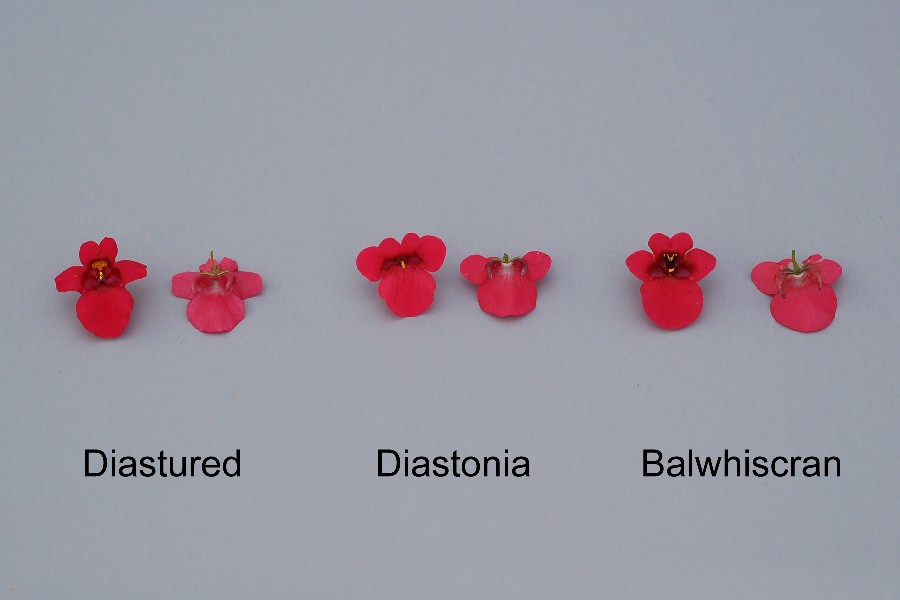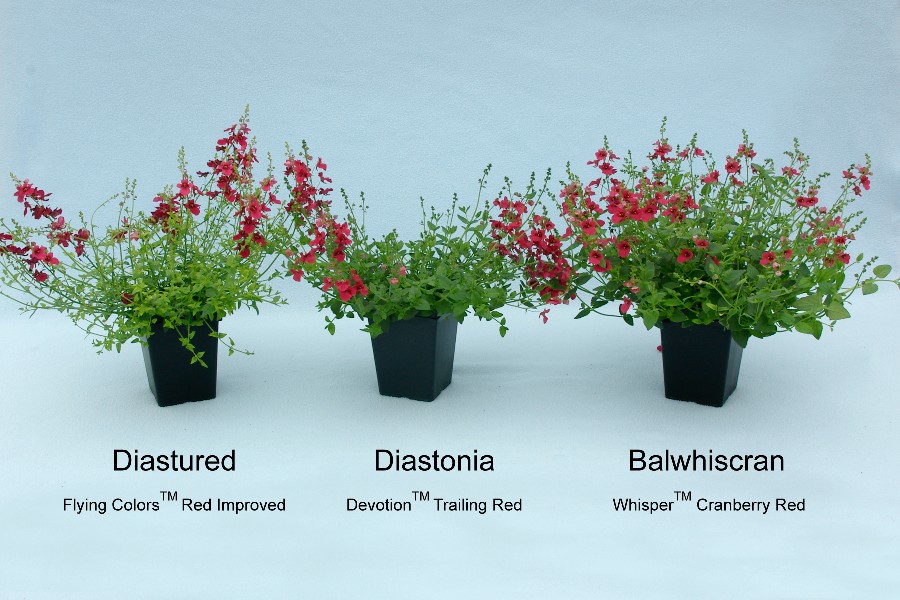Diastured
| Denomination: | 'Diastured' |
|---|---|
| Trade name: | Flying Colors Red Improved |
| Botanical Name: | Diascia barberae |
| Applicant/Holder: |
Syngenta Crop Protection AG Rosentalstrasse 67 Basel CH-4058 Switzerland |
| Breeder: |
Har Stemkens, Syngenta Seeds B.V., Enkhuizen, Netherlands |
| Agent in Canada: |
BioFlora Inc. 38723 Fingal Line R.R. #1 St. Thomas, Ontario N5P 3S5 Canada Tel: 519-317-7511 |
| Application Date: | 2005-04-22 |
| Application Number: | 05-4768 |
| Grant of Rights Date: | 2007-06-08 |
| Certificate Number: | 2773 |
| Date rights surrendered: | 2014-06-08 |
Variety Description
Varieties used for comparison: 'Diastonia' (Devotion Trailing Red) and 'Balwhiscran' (Whisper Cranberry Red)
Summary: Diastured' has shorter and narrower leaves than the reference varieties 'Diastonia' and 'Balwhiscran'. There is a high density of trichomal elaiophores on the lower corolla lobe of 'Diastured', whereas 'Diastonia' has moderate density of elaiophores and in 'Balwhiscran' they are very sparse. The elaiophores of 'Diastured' are dark purple to black, while they are dark purple in 'Diastonia' and black in 'Balwhiscran'.
Description:
PLANT: semi-upright to spreading growth habit, medium to tall in height, broad in width, medium branching, no anthocyanin colouration on stems
LEAF BLADE: medium green, short length, narrow width, no variegation, no anthocyanin colouration, truncate to cordate base, narrow acute apex, dentate margin (very shallow incisions), no hairiness
PEDUNCLE: medium to long internodes with short to medium length pedicels
COROLLA: medium length, medium width, dark pink red inner surface when flowers first open, ageing to dark purple red, moderate reflexing of lateral lobes
LOWER LOBE: as long as broad, very weak undulation of margin, very dense dark purple to black trichomal elaiophores
COROLLA THROAT: one medium yellow spot
SPUR: brown purple, strong curvature
Origin & Breeding History: 'Diastured' was developed by the breeder Har Stemkens, an employee of Syngenta Seeds B.V., in Enkhuizen, The Netherlands. The variety originated from a controlled cross made in August 2000, in Enkhuizen, between the female parent 'Diaspetis' and the male parent 'C0008-1'. A single plant was selected from this cross in May 2001, based on criteria for earliness, flower colour and field performance. Asexual reproduction by vegetative cuttings was first conducted in June 2001.
Tests & Trials: The trials for 'Diastured' were conducted in a polyhouse during the spring of 2006 in St. Thomas, Ontario. The trial included a total of 15 plants of each variety. All plants were grown from rooted cuttings transplanted into 11 cm pots on March 31, 2006. Observations and measurements were taken from 10 plants of each variety on May 17, 2006. All colour measurements were made using the 2001 RHS colour chart.
Comparison tables for 'Diastured' with reference varieties 'Diastonia' and 'Balwhiscran'
Length of leaf blade (cm)
| 'Diastured' | 'Diastonia' | 'Balwhiscran' | |
|---|---|---|---|
| mean | 1.8 | 2.3 | 2.8 |
| std. deviation | 0.32 | 0.21 | 0.30 |
Leaf blade width (cm)
| 'Diastured' | 'Diastonia' | 'Balwhiscran' | |
|---|---|---|---|
| mean | 1.1 | 1.6 | 1.7 |
| std. deviation | 0.29 | 0.14 | 0.19 |
Main colour of corolla (RHS)
| 'Diastured' | 'Diastonia' | 'Balwhiscran' | |
|---|---|---|---|
| inner side | 51A, ages to 53B-C | 53D, ages to 53C-D | 53C-D, ages to 58A |
Colour of spur (RHS)
| 'Diastured' | 'Diastonia' | 'Balwhiscran' | |
|---|---|---|---|
| main | 185B | 185B | 184B |
Click on image for larger view

Diascia: 'Diastured' (left) with reference varieties 'Diastonia' (centre) and 'Balwhiscran' (right)
Click on image for larger view

Diascia: 'Diastured' (left) with reference varieties 'Diastonia' (centre) and 'Balwhiscran' (right)
- Date modified: